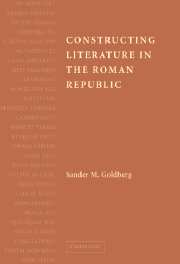1 - The Muse Arrives
Published online by Cambridge University Press: 03 May 2010
Summary
A certain fabius, who affected the imposing cognomen Ululitremulus (‘Owl-quaker’), ran a cleaning establishment at Pompeii just off the street we know as the Via dell' Abbondanza. He must have made some claim to education and experience. On the right doorpost of his shop was a large picture of a meticulously patrician Aeneas in high-laced boots and cuirass leading Anchises and Ascanius out from Troy, and opposite it was a similarly dressed Romulus, with the first spolia opima on his left shoulder. These paintings were not original creations: they recall the statues of Aeneas and Romulus that faced each other from two large exedrae in the Forum of Augustus at Rome. As such, the paintings are a nice example of Augustan iconography and of its enduring appeal even beyond the city. Yet Fabius' grandeur also set him up for a tease. Among the graffiti scrawled beneath the pictures is a hexameter verse, “Fullones ululamque cano, non arma virumque” (‘I sing of cleaners and owls, not arms and the man’). That joke at the expense of Fabius' pretensions is an equally nice reminder of how deeply the Aeneid rooted itself in the Roman consciousness and became inseparable in the Roman mind from Augustus' renovation of the Roman material and literary heritage.
Vergil's success, however, should not obscure another fact of literary history, which is the surprise his poem first generated among his peers. Roman poets of the 20s had learned to keep epic at a distance.
- Type
- Chapter
- Information
- Constructing Literature in the Roman Republic , pp. 20 - 51Publisher: Cambridge University PressPrint publication year: 2005



